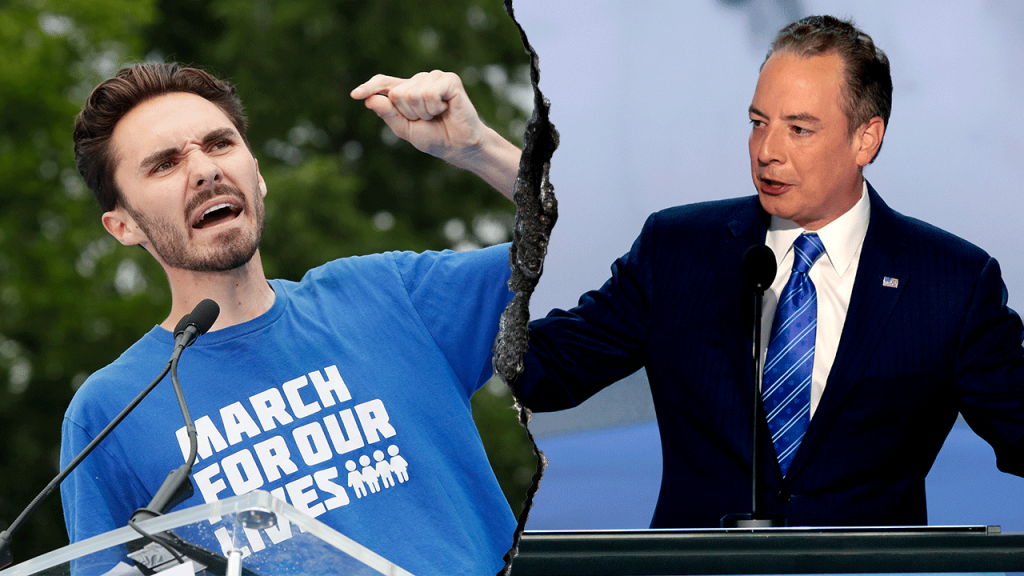In a recent heated exchange on ABC’s “This Week with George Stephanopoulos,” David Hogg, Vice Chair of the Democratic National Committee (DNC), and former Chief of Staff to President Donald Trump, Reince Priebus, engaged in a contentious debate regarding immigration policies and the deportation of Kilmar Abrego Garcia. Their discussion highlighted deep divisions within the Democratic Party, particularly following Hogg’s announcement of a $20 million initiative aimed at primarying long-serving Democratic incumbents. The clash not only underscored existing tensions but also raised questions about the future leadership and direction of the party.
| Article Subheadings |
|---|
| 1) Overview of the Exchange |
| 2) Context of the Debate |
| 3) Garcia’s Deportation and Its Implications |
| 4) The Role of Public Opinion |
| 5) Conclusion of the Discourse |
Overview of the Exchange
During the Sunday episode of ABC’s “This Week,” a clash unfolded between David Hogg and Reince Priebus that has garnered attention from both sides of the political spectrum. Hogg, who has become a prominent figure in Democratic circles since his activism following the Parkland shooting, stated his intent to challenge established Democratic incumbents. In response to Hogg’s plans, Priebus expressed his displeasure, claiming he would remove Hogg from the DNC if he could. This segment illuminated broader issues facing the Democratic Party, such as internal strife and strategies for countering the Republican Party.
Context of the Debate
The debate arose in the context of Hogg’s pledge to leverage $20 million towards funding campaigns to overthrow older Democratic incumbents who he perceives as being out of touch or ineffective. Priebus articulated that such an initiative cannot coexist with Hogg’s position within the party, arguing that an essential aspect of party unity hinges on supporting incumbents rather than undermining them. The stark contrast between Hogg’s younger approach and the older guard’s dependency illustrates a schism not only in ideology but also in generational perspective within the party.
Garcia’s Deportation and Its Implications
The contentious issue of Kilmar Abrego Garcia, an illegal immigrant who was deported under the Trump administration, further escalated the debate. Priebus cited Garcia’s alleged connections to the notorious MS-13 gang to justify the deportation, highlighting Trump’s policy of mass deportation of illegal immigrants. Conversely, Hogg sought to emphasize the moral implications of these actions by claiming they deviated from due process and basic human rights. The discussion epitomized the critical conflict between immigration policy and human rights, rendering a poignant reflection on how such policies affect real lives.
The Role of Public Opinion
Polls indicate a significant segment of the American population supports strict immigration policies, potentially complicating the Democrats’ stance on immigration reform. While Priebus referenced public sentiment as a basis for maintaining hardline policies, Hogg argued that a progressive message couched in human rights and due process resonates more with changing American values. The variance in approach underscores the challenge facing the Democratic Party as it seeks to balance traditional candidate approaches with the demands of a newer, more diverse electorate.
Conclusion of the Discourse
Ultimately, this exchange serves as a foreshadowing of the political battle lines being drawn within the Democratic Party, especially as the 2024 elections approach. Hogg’s determination to reshape the Democratic narrative aligns with a broader progressive push that seeks to redefine the party’s core policies. Meanwhile, Priebus’s defense reflects a staunch commitment to traditional Republican values that advocate for strict immigration enforcement. This internal conflict and external scrutiny will likely influence how each party positions its platform and candidates leading up to the elections.
| No. | Key Points |
|---|---|
| 1 | Hogg’s initiative to primary older Democratic incumbents represents a generational shift in party politics. |
| 2 | Priebus challenged Hogg’s position, emphasizing the need for party unity over internal conflict. |
| 3 | The deportation of Kilmar Abrego Garcia symbolizes key debates surrounding immigration and human rights. |
| 4 | Public opinion shows support for strict immigration policies, complicating the Democratic discussion on reform. |
| 5 | The electoral strategies for the upcoming 2024 elections are intricately tied to the party’s approach to social issues. |
Summary
The exchange between David Hogg and Reince Priebus illustrates the ongoing tensions within the Democratic Party as it grapples with leadership challenges and the influence of external factors on its policy direction. With Hogg representing a new wave of progressive thought, juxtaposed against Priebus’s traditional Republican stance, the conversation underscores the critical dialogue necessary for defining political parties in an increasingly polarized environment. Understanding these dynamics will be crucial for both parties as they prepare for the next electoral cycle, highlighting the importance of reconciled strategies that resonate with voters’ evolving expectations.
Frequently Asked Questions
Question: Why did David Hogg propose to primary older Democratic incumbents?
David Hogg believes that the current leadership within the Democratic Party is out of touch with the needs and expectations of a new generation of voters, prompting his initiative to challenge seasoned incumbents.
Question: What were the allegations against Kilmar Abrego Garcia?
Kilmar Abrego Garcia was characterized by the Trump administration as connected to the MS-13 gang, a claim that has been contested by immigration advocates and Hogg, who argue that he was wrongfully deported without due process.
Question: How does public opinion impact immigration policy debate in the U.S.?
Public sentiment is divided, with a significant portion of the American population supporting strict immigration measures, which complicates discussions around reform within the Democratic Party, as they aim to balance progressive values with broader voter concerns.


